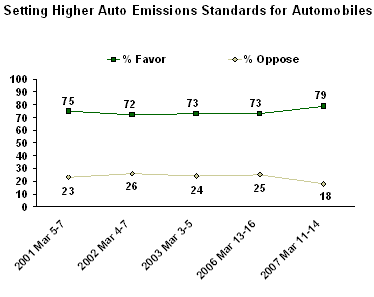On the heels of the US Supreme Court ruling that the Environmental Protection Agency has authority to regulate greenhouse gases as a pollutant (some called it a strong rebuke of the Bush administration’s policies), George W. Bush saw fit to ramp up his language on the issue of global warming (hint: the new key word is “serious”):
The decision (of) the Supreme Court we take very seriously. It’s the new law of the land. I’ve taken this issue very seriously. I have said that it is a serious problem. I recognize that man is contributing to greenhouse gases.
But, despite this outpouring of concern, the Prez kept to old-school thinking, arguing that “anything that happens cannot hurt economic growth.” (Clearly, nobody gave him any of the reports on the enormous costs that we will likely bear as a result of climate changes, or for that matter, the compelling memos that have been circulating about the economic opportunities the climate challenge presents to those with a touch of “American ingenuity.”)
The American public, on the other hand, appears more ready than Bush to embrace new thinking when it comes to solutions. Republicans and Democrats alike broadly embrace actions to curb emissions.
Based on a March telephone survey of 1,009 American adults, aged 18 and older, Gallup reports that thean overwhelming majority supports stronger government restrictions on greenhouse gas emissions. And, majorities, regardless of political persuasion, say we should spend more tax money to develop alternative sources of fuel and energy.
According to Gallup, 79 percent of Americans now favor setting higher emission standards for automobiles.
An even greater shift has come about in the percentage of Americans who favor setting higher emissions and pollution standards for business and industry, rising from 77 percent in March 2006 to 84 percent in March 2007.
While Bush remains insistent on voluntary action on the part of industry, there’s been a (statistically significant) 4-point increase in the percentage of Americans saying they are in favor of imposing mandatory controls on carbon dioxide emissions and other greenhouse gases—from 75 percent in 2006 to 79 percent today (69 percent of Republicans and 90 percent of Democrats).
Perhaps the most interesting finding—especially considering recent data showing a distinct partisan divide when it comes to concern about climate change—is that whatever quibbles remain, strong majorities of Democrats and Republicans seem to see eye to eye when it comes to practical climate change solutions—including investments by government in what Bush warns are “expensive” new technologies.
Congress is focused on solutions. The EPA has authorization. Corporate America, including the auto industry, seems open-minded. States are paving the way—especially in Cascadia. Partisan split or not, the Supreme Court is on board. The US electorate is ready….So, let’s get serious. Seriously.











Jan
“79 percent of Americans now favor setting higher emission standards for automobiles…”But I’ll bet only 5% of Americans understand that necessarily means smaller cars with smaller engines! (Why didn’t Gallup ask that question: “Would you be willing to drive a smaller, less powerful car to reduce greenhouse gas emissions?”)My pessimistic point of view Americans are all for saving the planet, as long as they don’t have to change the way they line.